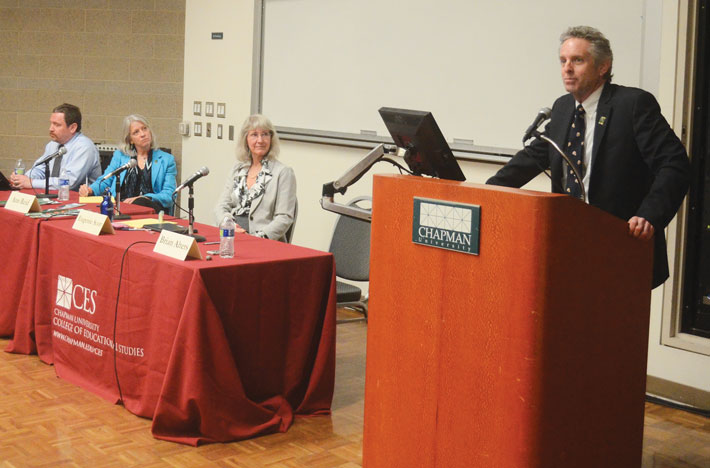 Last Friday evening, I moderated a discussion at Chapman University. Speaking on the panel were Eugenie C. Scott, recently retired executive director of the National Center for Science Education, Ben Santer, research scientist at the Lawrence Livermore National Laboratory, and member of NCSE’s board of directors, and Brian Alters, Professor at Chapman University in Orange, California, and president of the board of NCSE.
Last Friday evening, I moderated a discussion at Chapman University. Speaking on the panel were Eugenie C. Scott, recently retired executive director of the National Center for Science Education, Ben Santer, research scientist at the Lawrence Livermore National Laboratory, and member of NCSE’s board of directors, and Brian Alters, Professor at Chapman University in Orange, California, and president of the board of NCSE.
As I listened to the panelists talk about ongoing challenges to evolution and climate change education, I was struck by how important NCSE is, and what a privilege it is to be the new executive director.
Why does NCSE matter? Why do we care so passionately that students learn about evolution and climate science in a manner that is unmuddied by pseudoscience or false controversy? Here are just three of many reasons.
First, NCSE matters because we support the teaching of two of the thorniest topics in science education: evolution and climate change. Despite their importance, there is widespread resistance to these areas of science being taught well—or at all. The reasons for the resistance are somewhat different: resistance to the teaching of evolution is primarily religious in nature, while resistance to teaching about climate science is primarily political. Still, as with evolution, climate educators have to struggle with pernicious efforts to persuade people that the science is controversial. A further challenge for climate educators is the lack of a clear understanding of where this inherently multidisciplinary topic fits into the traditional science curriculum. In both cases, however, NCSE has the long and deep experience of working with educators necessary to help them address these issues.
Second, NCSE matters because the topics we focus on—evolution and climate change—not only face challenges in the classroom, but also are prime examples of how science denial is used to advance religious and political agendas. Casting doubt on science can be an effective weapon in the political arena, but it is an extraordinarily dangerous one for our society, which is facing complex challenges in the areas of health, food, energy, and environment. Hard choices and wise decisions will have to be made between competing priorities and where to invest scarce resources. Learning how to evaluate evidence and draw justified conclusions as scientists do are skills that our children need to develop, whether they become scientists themselves or not. Evolution and climate science both provide powerful case studies for students to learn about the nature of science and the sources of science denial.
Finally, we cannot afford to waste a single brilliant mind. Sitting in a classroom in Louisiana right now might be the girl who could grow up to discover the cure for Alzheimer’s disease, or the boy who could grow up to develop drought-resistant wheat. Many of today’s most respected scientists grew up in small towns with nary a research scientist role model in sight. J. Michael Bishop, for example, a winner of the Nobel Prize in Physiology or Medicine in 1989, grew up in a small rural town in Pennsylvania and received his first eight years of education in a two-room school. Phillip Sharp, a winner of the 1993 Nobel Prize in Physiology or Medicine, grew up in a rural community in northern Kentucky not far from where the Creation Museum now stands. Some science teacher, somewhere along the line, captured their imaginations and set their feet on the path to careers in science. Our lives have been enriched as a result. What if, instead, they had been taught that evolution is a flawed theory, climate change is a hoax, and scientific questions can be resolved by debate or reference to the Bible, rather than by evidence? Our world would be the poorer for it. NCSE knows this, and such miseducation is what we work tirelessly to combat.
NCSE’s work is far from over. Educators still need our support to push back against misinformation and find the best resources possible to teach about evolution and climate change. I feel fortunate to be joining a team of scientists and advocates who work to ensure every child in America receives the best science education on topics that are challenging for many educators to address. Without NCSE, where would educators go when a student brings a creationist text to class or a parent demands that “both sides” of climate change be taught in her classroom? NCSE has been the go-to place for students, parents, educators, scientists, and community members for help dealing with science denial. I am thrilled to be taking on these challenges as the new executive director, because I don’t want to imagine a world without NCSE. Do you?
(Photo credit: Rachel Fechser, The Panther)

